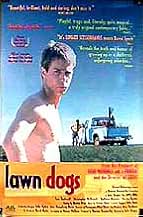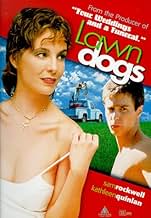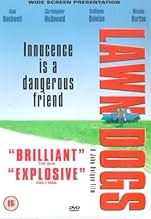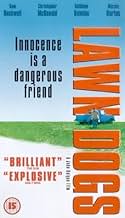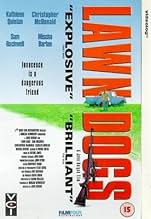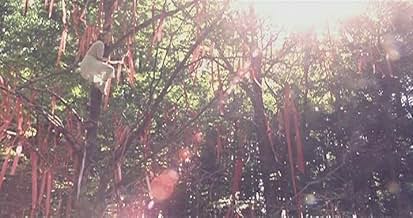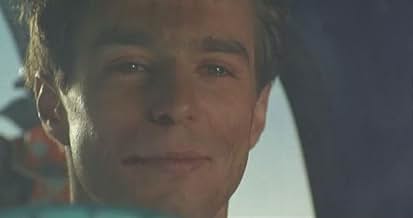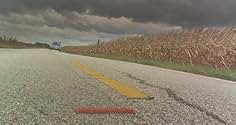PUNTUACIÓN EN IMDb
7,4/10
9 mil
TU PUNTUACIÓN
Añade un argumento en tu idiomaWhen Devon, a 10-year-old girl, forges a friendship with Trent, a 21-year-old outsider who mows the neighborhood lawns, things suddenly get very complicated and private.When Devon, a 10-year-old girl, forges a friendship with Trent, a 21-year-old outsider who mows the neighborhood lawns, things suddenly get very complicated and private.When Devon, a 10-year-old girl, forges a friendship with Trent, a 21-year-old outsider who mows the neighborhood lawns, things suddenly get very complicated and private.
- Premios
- 7 premios y 4 nominaciones en total
John Bacon
- Neighbor at Barbecue
- (sin acreditar)
Khris Colgate
- Neighbor at Barbecue
- (sin acreditar)
Reseñas destacadas
From the picture on the cover (see the picture on the main details page!) and reading the back of the video jacket for this movie, I expected this to be a film about suburban wives sleeping with the hired help. Nope. It's a movie about a slightly sick [in the mental and physical sense] young girl [about 10 or 11 years old?] who befriends one of the guys hired to mow the lawns in her gated community. While the guy is reluctant at first, the friendship that forms between them is actually fun to watch. That's what makes the movie interesting. But while the end has to do with the class system talked about on the video jacket, this is a story about the girl and her "lawn dog" friend, with the parents and their repressive lifestyle being almost incidental to the story until the end. This is an interesting movie to watch, but I wish the people who write the blurbs on the video jackets would actually WATCH the movies once in a while.
Trent is a young man living in a trailer in a wooded area beyond the suburbs. He makes a living cutting the massive lawns of the populace of a gated suburb village. He befriends a young girl from within the suburb, who herself has some stability issues, despite being only 10 years old. The two build a friendship despite the resentment towards the `white trash' Trent from within the suburb,
I didn't know what this film was about before I sat and watched it, reading the plot summary in the tv guide as the title sequence began, I wondered if I would bother, but I'm glad I did. The film works on several level the most apparent of which is the simple story of a friendship that is threatened. This part works well as the friendship never seems forced and, although the spectre of sexual tension is there (in Trent occasionally feeling uncomfortable), it is not a strand that is actually part of their relationship.
This all works well due (in most part) to two great performances from Barton and Rockwell. Barton shows amazing maturity and ability to carry the role off without it being like many child stars (where it is clear they are forcing everything). Rockwell meanwhile is a mass of subtleties and little touches that make his character likeable.
However this part wouldn't work as well if it weren't for the wider theme of the trash being poorly treated by the smugger middle classes. This theme creates the reason for the threat to their friendship (more or less) but it also serves as a humbling attack on a class that lives a selfish, scared life behind gates with private security guards. Such places are increasingly common in America and this film is clear as to their effect on both those inside them as well as the wider community of America. Although it keeps a gentle tone for the most, the film depicts those in the suburb as selfish, aloof and fearful. Even more condemning about this depiction is that it never feels like they have been exaggerated or monsterised in any way!
The script is well written and certainly makes the actors jobs a lot easier certainly Barton benefits from great dialogue and character development. Rockwell meanwhile benefits more from direction as much of his best work is not dialogue based. McDonald, Quinlan and McGill all do solid work in support. The end of the film is a little worrying as it appears to veer off at a tangent, but the final sentiment is beautifully presented and encouraging (albeit due to a child's apparent naivety).
Overall this is a lovely film that I'm very glad I watched. About more than just an adult/child friendship, this film is moving and involving in both it's core plot and it's wider themes.
I didn't know what this film was about before I sat and watched it, reading the plot summary in the tv guide as the title sequence began, I wondered if I would bother, but I'm glad I did. The film works on several level the most apparent of which is the simple story of a friendship that is threatened. This part works well as the friendship never seems forced and, although the spectre of sexual tension is there (in Trent occasionally feeling uncomfortable), it is not a strand that is actually part of their relationship.
This all works well due (in most part) to two great performances from Barton and Rockwell. Barton shows amazing maturity and ability to carry the role off without it being like many child stars (where it is clear they are forcing everything). Rockwell meanwhile is a mass of subtleties and little touches that make his character likeable.
However this part wouldn't work as well if it weren't for the wider theme of the trash being poorly treated by the smugger middle classes. This theme creates the reason for the threat to their friendship (more or less) but it also serves as a humbling attack on a class that lives a selfish, scared life behind gates with private security guards. Such places are increasingly common in America and this film is clear as to their effect on both those inside them as well as the wider community of America. Although it keeps a gentle tone for the most, the film depicts those in the suburb as selfish, aloof and fearful. Even more condemning about this depiction is that it never feels like they have been exaggerated or monsterised in any way!
The script is well written and certainly makes the actors jobs a lot easier certainly Barton benefits from great dialogue and character development. Rockwell meanwhile benefits more from direction as much of his best work is not dialogue based. McDonald, Quinlan and McGill all do solid work in support. The end of the film is a little worrying as it appears to veer off at a tangent, but the final sentiment is beautifully presented and encouraging (albeit due to a child's apparent naivety).
Overall this is a lovely film that I'm very glad I watched. About more than just an adult/child friendship, this film is moving and involving in both it's core plot and it's wider themes.
Sam Rockwell is one of those actors who, no matter what role he's playing, is totally natural. He's immediately likable. I've always been a big fan of his, and up until yesterday had never before seen Lawn Dogs, one of the earliest films wherein he has a bigger role. He's very quietly, calmly good in it, and even in the scenes where he's playing and goofing around with Mischa Barton and it seems awkward, he maintains a pure, natural presence.
Lawn Dogs says something important about the most generic slice of American life, the geometrically shaped and calculated life in the suburbs. The film doesn't unmask it. Cleverly, it maintains that quiet, perpetually sunny, middle-of-nowhere feeling of a classic subdivision, and then displays a sad and maddening scenario of misunderstanding in a closed-minded, insular neighborhood and the hauntingly realistic characters. There is a bit of animal violence in this movie, but it's played out in a tautly spare way that's just as frustrating as vain, judgmental people and matter of the rest of the film.
Lawn Dogs is a refreshing sort of film. The relationship between Rockwell and Barton is heartwarming and broadly, gently natural. It's good to experience a story that altruistically communicates the genuine existence and state of mind that is often questioned and often misunderstood.
Lawn Dogs says something important about the most generic slice of American life, the geometrically shaped and calculated life in the suburbs. The film doesn't unmask it. Cleverly, it maintains that quiet, perpetually sunny, middle-of-nowhere feeling of a classic subdivision, and then displays a sad and maddening scenario of misunderstanding in a closed-minded, insular neighborhood and the hauntingly realistic characters. There is a bit of animal violence in this movie, but it's played out in a tautly spare way that's just as frustrating as vain, judgmental people and matter of the rest of the film.
Lawn Dogs is a refreshing sort of film. The relationship between Rockwell and Barton is heartwarming and broadly, gently natural. It's good to experience a story that altruistically communicates the genuine existence and state of mind that is often questioned and often misunderstood.
I am baptized in the blood, `bathtubs full,' of wild dogs, chicken dinners, and a little fairy princess. Last night I viewed "Lawn Dogs" for the second time in 5 days. I just couldn't return the tape without another look-see, even if it makes Block Buster $2 richer and me $2 poorer, for the awareness and inspiration this fairy-tale masterpiece has imbued me with are priceless. Like Trent in the film, I am alive with the hope that flight from any kind of poverty, financial or spiritual, is possible.
On the surface, the story seems to revolve around the relationship between a young man, Trent, and a little girl, Devon, and between the two struggling economic classes that they come from. But the magical cinematography throughout the film, and more than that, Devon's running fairy-tale narration, allude to a deeper meaning in the film that is revealed absolutely in the last five minutes. After all, there is nothing in the world around us that is not represented by symbols within us, and how can we tell whether the inner symbols we deal with represent things outside us, or things within us? It is natural for the world to discourage a relationship between a sexually-active male, and a prepubescent, vulnerable, hungry-for-friends female. It is also natural for the world to discourage an individual from relating to the power within himself, perhaps represented by said young female, to imagine and pursue a better life for himself, when it means he will flee the status quo that makes the rest of the world comfortable.
The setting is a highly artificial, unabashedly bourgeois, gated community in Kentucky, `Camelot Gardens' (see, we're already alluding to fairy tales), and the surrounding countryside, wherein Trent lives in a trailer, making, what can loosely be called, a "living" by mowing the lawns of the rich in Camelot Gardens. The two heroes first meet when Devon happens upon Trent's trailer while wandering into the woods to sell cookies (her capitalist parents' idea), reciting to herself a version of the Russian fairy-tale about the contest between a little girl, like herself, and the witch named `Baba Yaga.' She continues her relationship with the at-first-reluctant Trent, as he continues to mow her parents' lawn. Whom she identifies Baba Yaga with, that is, who is evil in the world, evolves with the story. In the end, she realizes where the true evil lies, and uses the magic charms of her youthful idealism to aid the flight of the oppressed.
I really enjoyed this film. It not only inspires hope, but also possesses a depth sorely lacking in the majority of American films. Much of the symbolism in the story seems to be lifted directly from classical mythology: From the open nakedness of both heroes in the beginning, a necessary reduction of the self to its bare essentials before it can be remade into something new, Trent holding up traffic to dive naked from a one-lane bridge into the local river, a kind of spectacular baptism into a new beginning, and Devon removing her nightgown to bay from her rooftop, like some essential mythic beast imploring the gods of night; to the adorning, i.e. honoring, of the tree outside the door of Trent's trailer, the Sacred Tree, Ygdrasil, the Tree of Life, so honoring life itself, and the demands that life makes of us; to the maenadic frenzy of the dancing chicken feet, a maddening after-chicken-death/chicken-dinner dithyramb; to Trent's conquest over the infernal hound, a Doberman named `Tracker,' who guards the homes of Camelot Gardens, and perhaps guards as well the path to personal power, the hound who, like Cerberus, turns away all cowards (chickens) from the inner realms; to the magic towel and comb of divine deliverance (more on these two symbols below) at the end; the story is full of age-old symbols that affect us deeply, transforming us or renewing us, without our knowing how.
The following passage is taken from Marie-Louise von Franz's `Interpretation of Fairy Tales.' It will help the reader to understand the meaning of the magic comb and towel. (In von Franz's story, a red handkerchief substitutes for the towel.)
Says von Franz:
The girl runs, throwing her magic comb and her red handkerchief behind her. Bestrewing one's trail with objects is characteristic of the magic flight. This act of throwing away things of value is a sacrifice; one throws things over one's shoulder to the dead, or to spirits, or to the devil, to propitiate those whom we dare not face. It may seem panicky to abandon valuable possessions when one is escaping, but one who stiffens himself into a defensive attitude is easily cut down by an assailant stronger than himself, whereas stripping oneself gives mobility. There are situations in which one absolutely has to give up wanting anything, and in this way one slips out from under; one is not there any longer, so nothing more can go wrong. When one is confronted by a hopelessly wrong situation, one must just make a drastic leap to the bottom of passive simplicity, and from there one can live it out.
What is more, the objects which have been sacrificed generally transform themselves into obstacles for the pursuer. The comb at once turns into a forest and becomes a part of nature the hair of mother earth. Its transformation into a natural object suggests that originally it was an integral part of nature. Actually, there is no thought or instrument or object that has not originated from nature; that is, from the unconscious psyche. One sacrifices to the unconscious what once was wrested from it.
The comb is used to arrange and confine the hair. Hair is a source of magic power or mana. Ringlets of hair, preserved as keepsakes, are believed to connect one individual with another over a distance. Cutting the hair and sacrificing it often means submission to a new collective state a giving up and a rebirth. The coiffure is frequently an expression of a cultural Weltanschauung. Primitive folk tales speak of demons being deloused and combed when they are caught, which means that the confusion in the unconscious has to be straightened out, ordered, and made conscious. Because of this meaning, hair in wild disarray is often dreamed of at the start of an analysis. The comb, therefore, represents a capacity for making one's thoughts ordered, clear, and conscious.
The red handkerchief that the girl gives up becomes a flame soaring from earth to heaven. To abandon the staff and comb meant not attempting to marshal herself or to think out a plan. Now the flame indicates that she puts an inner distance between herself and her feelings and emotions. She is reduced to a passive simplicity.
In the tale, the gaping jaws devour the forest and spit water on the flame. Water and fire battle in the unconscious, and in the meantime the girl escapes between the opposites.
On the surface, the story seems to revolve around the relationship between a young man, Trent, and a little girl, Devon, and between the two struggling economic classes that they come from. But the magical cinematography throughout the film, and more than that, Devon's running fairy-tale narration, allude to a deeper meaning in the film that is revealed absolutely in the last five minutes. After all, there is nothing in the world around us that is not represented by symbols within us, and how can we tell whether the inner symbols we deal with represent things outside us, or things within us? It is natural for the world to discourage a relationship between a sexually-active male, and a prepubescent, vulnerable, hungry-for-friends female. It is also natural for the world to discourage an individual from relating to the power within himself, perhaps represented by said young female, to imagine and pursue a better life for himself, when it means he will flee the status quo that makes the rest of the world comfortable.
The setting is a highly artificial, unabashedly bourgeois, gated community in Kentucky, `Camelot Gardens' (see, we're already alluding to fairy tales), and the surrounding countryside, wherein Trent lives in a trailer, making, what can loosely be called, a "living" by mowing the lawns of the rich in Camelot Gardens. The two heroes first meet when Devon happens upon Trent's trailer while wandering into the woods to sell cookies (her capitalist parents' idea), reciting to herself a version of the Russian fairy-tale about the contest between a little girl, like herself, and the witch named `Baba Yaga.' She continues her relationship with the at-first-reluctant Trent, as he continues to mow her parents' lawn. Whom she identifies Baba Yaga with, that is, who is evil in the world, evolves with the story. In the end, she realizes where the true evil lies, and uses the magic charms of her youthful idealism to aid the flight of the oppressed.
I really enjoyed this film. It not only inspires hope, but also possesses a depth sorely lacking in the majority of American films. Much of the symbolism in the story seems to be lifted directly from classical mythology: From the open nakedness of both heroes in the beginning, a necessary reduction of the self to its bare essentials before it can be remade into something new, Trent holding up traffic to dive naked from a one-lane bridge into the local river, a kind of spectacular baptism into a new beginning, and Devon removing her nightgown to bay from her rooftop, like some essential mythic beast imploring the gods of night; to the adorning, i.e. honoring, of the tree outside the door of Trent's trailer, the Sacred Tree, Ygdrasil, the Tree of Life, so honoring life itself, and the demands that life makes of us; to the maenadic frenzy of the dancing chicken feet, a maddening after-chicken-death/chicken-dinner dithyramb; to Trent's conquest over the infernal hound, a Doberman named `Tracker,' who guards the homes of Camelot Gardens, and perhaps guards as well the path to personal power, the hound who, like Cerberus, turns away all cowards (chickens) from the inner realms; to the magic towel and comb of divine deliverance (more on these two symbols below) at the end; the story is full of age-old symbols that affect us deeply, transforming us or renewing us, without our knowing how.
The following passage is taken from Marie-Louise von Franz's `Interpretation of Fairy Tales.' It will help the reader to understand the meaning of the magic comb and towel. (In von Franz's story, a red handkerchief substitutes for the towel.)
Says von Franz:
The girl runs, throwing her magic comb and her red handkerchief behind her. Bestrewing one's trail with objects is characteristic of the magic flight. This act of throwing away things of value is a sacrifice; one throws things over one's shoulder to the dead, or to spirits, or to the devil, to propitiate those whom we dare not face. It may seem panicky to abandon valuable possessions when one is escaping, but one who stiffens himself into a defensive attitude is easily cut down by an assailant stronger than himself, whereas stripping oneself gives mobility. There are situations in which one absolutely has to give up wanting anything, and in this way one slips out from under; one is not there any longer, so nothing more can go wrong. When one is confronted by a hopelessly wrong situation, one must just make a drastic leap to the bottom of passive simplicity, and from there one can live it out.
What is more, the objects which have been sacrificed generally transform themselves into obstacles for the pursuer. The comb at once turns into a forest and becomes a part of nature the hair of mother earth. Its transformation into a natural object suggests that originally it was an integral part of nature. Actually, there is no thought or instrument or object that has not originated from nature; that is, from the unconscious psyche. One sacrifices to the unconscious what once was wrested from it.
The comb is used to arrange and confine the hair. Hair is a source of magic power or mana. Ringlets of hair, preserved as keepsakes, are believed to connect one individual with another over a distance. Cutting the hair and sacrificing it often means submission to a new collective state a giving up and a rebirth. The coiffure is frequently an expression of a cultural Weltanschauung. Primitive folk tales speak of demons being deloused and combed when they are caught, which means that the confusion in the unconscious has to be straightened out, ordered, and made conscious. Because of this meaning, hair in wild disarray is often dreamed of at the start of an analysis. The comb, therefore, represents a capacity for making one's thoughts ordered, clear, and conscious.
The red handkerchief that the girl gives up becomes a flame soaring from earth to heaven. To abandon the staff and comb meant not attempting to marshal herself or to think out a plan. Now the flame indicates that she puts an inner distance between herself and her feelings and emotions. She is reduced to a passive simplicity.
In the tale, the gaping jaws devour the forest and spit water on the flame. Water and fire battle in the unconscious, and in the meantime the girl escapes between the opposites.
I first saw this film on late night BBC in England and was half watching it while packing for college. By the half way mark, i was sucked in and couldn't not watch.
The first thing that will knock you out is Sam Rockwell. Over the last few years he has risen in fame due to high-profile parts in Charlie's Angels, The Green Mile and Mamet's Heist, but here is the arrival of a veritable acting talent. His is a simple, truthful unshowy performance that resonates throughout the film without crushing it. He is the film's heart, rather than a scene-stealer. As we learn more about his poor, white-trash lawn cutter, we sympathise and begin to realise how easily the reactions of others higher up on the food chain conspire to create chaos for him.
I won't give too much about the story away, because it frequently heads off in new, interesting directions, but essentially this is the story of Devon (newcomer child actor Mischa Barton) and the above mentioned Trent (Rockwell) and their relationship. He is poor, she comes from wealthy stock, but feels out of place in her materialistic world and they are both children of nature. What makes it compelling is that she knows this and revels in it and Trent has to be shown, by her.
John Duigan does a wonderful job of introducing strands and themes which at first seem offbeat and peculiar but which all add to the sense prejudice, division and isolation felt by these two brillaintly-wrought characters. Each find the other intriguing but are hesitant to become close because of others' values. Eventually they become friends and just as they accept this, the world around them turns on them and what started out as an irreverent comedy-drama, turns into something much darker and even terrifying.
Where the film goes from there, I will leave to you to discover. Please do, because this is a very unique film in American independent cinema. Much like the more high-profile American Beauty, what at first seems like character cliche and predictability rapidly leads you down the path least expected. Its beautifully shot, making full use of a handful of gorgeous locations, wonderfully acted, particularly by Barton and Rockwell, but also by the ever-reliably sleazy Christopher Mcdonald (Shooter McGavin in Happy Gilmore and Louise's husband in Thelma & Louise), the quietly strong Kathleen Quinlan and the lesser spotted Bruce McGill in one of his best roles as security guard Nash. The music is also peerless, at first playful and calm, building to a dramatic climax.
That climax is what makes this film stand head and shoulders above the rest. An emotional pay-off such as you have never seen in a film of this ilk. 9/10
The first thing that will knock you out is Sam Rockwell. Over the last few years he has risen in fame due to high-profile parts in Charlie's Angels, The Green Mile and Mamet's Heist, but here is the arrival of a veritable acting talent. His is a simple, truthful unshowy performance that resonates throughout the film without crushing it. He is the film's heart, rather than a scene-stealer. As we learn more about his poor, white-trash lawn cutter, we sympathise and begin to realise how easily the reactions of others higher up on the food chain conspire to create chaos for him.
I won't give too much about the story away, because it frequently heads off in new, interesting directions, but essentially this is the story of Devon (newcomer child actor Mischa Barton) and the above mentioned Trent (Rockwell) and their relationship. He is poor, she comes from wealthy stock, but feels out of place in her materialistic world and they are both children of nature. What makes it compelling is that she knows this and revels in it and Trent has to be shown, by her.
John Duigan does a wonderful job of introducing strands and themes which at first seem offbeat and peculiar but which all add to the sense prejudice, division and isolation felt by these two brillaintly-wrought characters. Each find the other intriguing but are hesitant to become close because of others' values. Eventually they become friends and just as they accept this, the world around them turns on them and what started out as an irreverent comedy-drama, turns into something much darker and even terrifying.
Where the film goes from there, I will leave to you to discover. Please do, because this is a very unique film in American independent cinema. Much like the more high-profile American Beauty, what at first seems like character cliche and predictability rapidly leads you down the path least expected. Its beautifully shot, making full use of a handful of gorgeous locations, wonderfully acted, particularly by Barton and Rockwell, but also by the ever-reliably sleazy Christopher Mcdonald (Shooter McGavin in Happy Gilmore and Louise's husband in Thelma & Louise), the quietly strong Kathleen Quinlan and the lesser spotted Bruce McGill in one of his best roles as security guard Nash. The music is also peerless, at first playful and calm, building to a dramatic climax.
That climax is what makes this film stand head and shoulders above the rest. An emotional pay-off such as you have never seen in a film of this ilk. 9/10
¿Sabías que...?
- CuriosidadesRandy Peterson, the stuntman who doubled for Sam Rockwell in the dive off the bridge early in the film, performed the stunt a total of six times - five times completely naked, and once wearing briefs (in case an alternative shot would be needed for a US TV version). The bridge (in Louisville, Kentucky, USA) was 30 feet high and the water around nine feet deep.
- PifiasWhen Devon pours a glass of water for Trent it is less than half full. In the next scene outside it is seen to be more than half full even after splashing it about.
- Versiones alternativasFor showing on US television, all of the profanity was dubbed over with less extreme words, the sex scene between Trent and Pam (at around 20 minutes in) used an alternate take where they are wearing clothes as opposed to them being nude in the original, and the scene where Trent dives off the bridge completely naked (at around 10 minutes in) used an alternate take with him (actually a stunt man) wearing underwear. The alternate takes were filmed with the intention of this being shown on TV in the US. The version streaming on several internet services (Amazon, Tubi, etc.) is this censored TV version.
- ConexionesReferenced in Jersey Girl (Una chica de Jersey) (2004)
- Banda sonoraShake And Shiver
Performed by Jubilee
Courtesy of Silvertone Records, Ltd.
Written by Ross Baxter, Chris Holditch, Garron Firth and Lee Severin (as Baxter/Frith/Holdich/Severin
Used by permission of Zomba Music Publishers Ltd.
Selecciones populares
Inicia sesión para calificar y añadir a tu lista para recibir recomendaciones personalizadas
- How long is Lawn Dogs?Con tecnología de Alexa
Detalles
Taquilla
- Presupuesto
- 8.000.000 US$ (estimación)
- Recaudación en Estados Unidos y Canadá
- 106.404 US$
- Fin de semana de estreno en EE. UU. y Canadá
- 22.491 US$
- 17 may 1998
- Recaudación en todo el mundo
- 106.404 US$
- Duración1 hora 41 minutos
- Mezcla de sonido
- Relación de aspecto
- 1.85 : 1
Contribuir a esta página
Sugerir un cambio o añadir el contenido que falta

Principal laguna de datos
By what name was Inocencia rebelde (1997) officially released in India in English?
Responde

